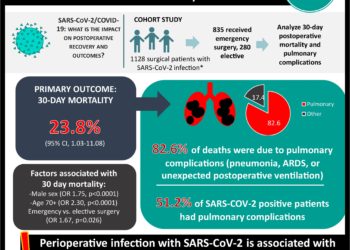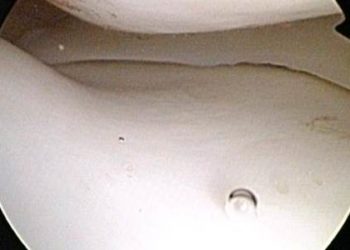Resident involvement linked with more complications in joint surgery
Image: PD
1. Resident involvement in orthopedic trauma procedures did not produce worse outcomes for the majority of common procedures.
2. Resident involvement was linked with mildly increased risk of complications for primary joint arthroplasty.
Evidence Rating Level: 2 (Good)
Study Rundown: The apprenticeship model of postgraduate medical education has been in place since the late nineteenth century. Since then, many modifications including hour restrictions and increased supervision have been instituted in the effort of decreasing trainee-related risks. There is still, however, significant concern that resident participation in patient care may lead to more mistakes. This study used a large database to evaluate the effect of resident participation on perioperative complications and mortality following common orthopedic surgical procedures, and demonstrated that the risk of minor specific and major systemic complications was higher when residents were involved. While this is currently the largest and most complete study analyzing the effect of resident involvement on orthopedic surgery outcomes, it is limited in its level of detail: resident level and extent of resident involvement in procedures is not explicitly analyzed.
Click to read the study in Arch Orthop Trauma Surg
Relevant Reading: Impact of resident participation on laparoscopic inguinal hernia repairs: are residents slowing us down?
In-Depth [retrospective cohort study]: This study evaluated data from 43,343 patients taken from the National Surgical Quality Improvement Program database, excluding pediatric, acute trauma, and orthopedic oncology cases. Twelve procedures emphasized in the standard orthopedic curriculum and representative of the major sub-specialties were selected. Thirty-day post-operative outcomes were evaluated, and complications were categorized as major systemic, major local, minor systemic, or minor local, with post-operative infections recorded separately. 35% of procedures were performed with resident participation. 10% of cases had a reported complication, with UTI being the most common, followed by superficial wound infection (both 2%). Multivariate analysis showed that resident participation in joint arthroplasty increased risk of one or more complications [OR 1.3 (95%CI 1.1, 1.4]; p < 0.001) and major systemic complications [OR 1.6 (95% CI 1.3, 2.0); p < 0.001]. A sensitivity analysis confirmed these trends. No significant association was found between resident participation and outcomes in other categories, nor with significant mortality risk for any procedural category.
By Mariya Samoylova and Allen Ho
More from this author: Promising liver transplant outcomes at 20 years; Transfusion worsens outcomes for HCV+ liver transplant recipients; Endovascular repair of ruptured AAAs no better than open repair
© 2013 2minutemedicine.com. All rights reserved. No works may be reproduced without expressed written consent from 2minutemedicine.com. Disclaimer: We present factual information directly from peer reviewed medical journals. No post should be construed as medical advice and is not intended as such by the authors, editors, staff or by 2minutemedicine.com. PLEASE SEE A HEALTHCARE PROVIDER IN YOUR AREA IF YOU SEEK MEDICAL ADVICE OF ANY SORT.







